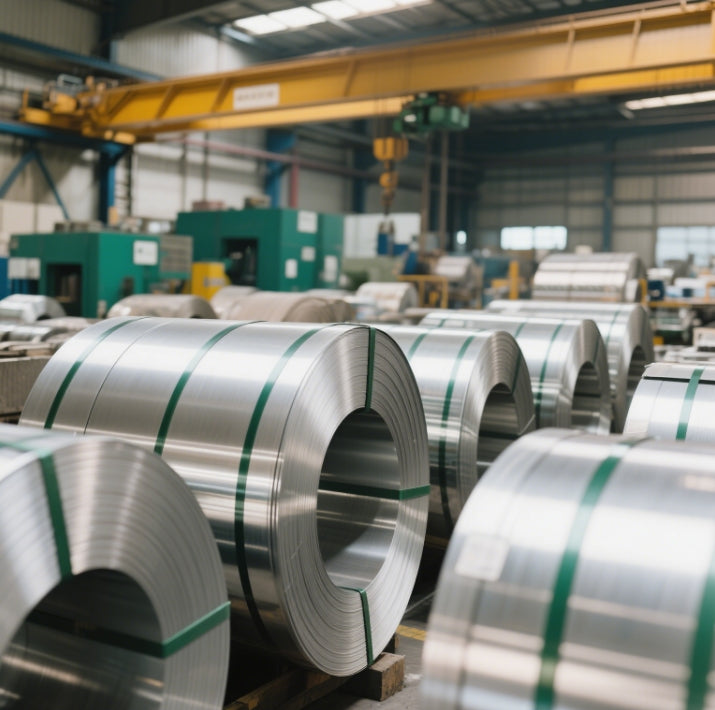StockSteel
Unmatched 316/430 Stainless Steel Coil | Mirror Polished Strength
Unmatched 316/430 Stainless Steel Coil | Mirror Polished Strength
Couldn't load pickup availability
Unmatched 316/430 Stainless Steel Coil | Mirror Polished Strength
Product Overview
| Property | 316 Stainless Steel Coil | 430 Stainless Steel Coil |
|---|---|---|
| Material Grade | ASTM A240, SUS316, EN 1.4401 | ASTM A240, SUS430, EN 1.4016 |
| Thickness | 0.1–20 mm | 0.02–3.0 mm |
| Width | 10–2000 mm | 3.5–1550 mm |
| Surface Finish | 2B, BA, No.4, Mirror, HL | 2B, BA, 8K, Hairline, NO.1 |
| Hardness | ≤187 HB (Annealed) | ≤183 HB |
| Tensile Strength | 520–750 MPa | ≥450 MPa |
| Yield Strength | ≥290 MPa | ≥205 MPa |
| Elongation | ≥40% | ≥22% |
| Density | 7.99 g/cm³ | 7.70 g/cm³ |
| Melting Point | 1375–1400°C | 1427°C |
| Processing | Cold/Hot Rolled, Slitting, Welding, Punching, Cutting | Cold/Hot Rolled, Decorative Embossing, Slitting |
| Certifications | ISO 9001, RoHS, SGS | ASTM, JIS, GB/T |
Key Technical Specifications
Tensile & Bend Strength
316 Stainless Steel Coil excels in high-stress environments due to its molybdenum content (2–3%), which enhances resistance to pitting and crevice corrosion. Its tensile strength ranges from 520–750 MPa, making it ideal for marine, chemical, and medical applications. The material’s ductility (≥40% elongation) ensures excellent formability for complex fabrication.
430 Stainless Steel Coil, a ferritic chromium alloy (16–18% Cr), offers moderate tensile strength (≥450 MPa) and superior thermal conductivity. While less corrosion-resistant than 316, it is cost-effective for automotive trim, kitchen appliances, and architectural components.
Weight Calculation
The weight of stainless steel coils is calculated using:
For example, a 316 stainless steel coil (3mm thick, 1.2m wide, 50m long) weighs:
Identification Methods
- Chemical Analysis: Verify Cr (16–18%), Ni (10–14%), and Mo (2–3%) for 316 stainless steel; Cr (16–18%) and low Ni for 430 stainless steel.
- Spark Testing: 316 produces fewer sparks with a reddish streak, while 430 generates brighter, shorter sparks.
- Magnetic Testing: 430 is magnetic; 316 is non-magnetic unless cold-worked.
Causes of Stainless Steel Corrosion
- Electrochemical Corrosion: Moisture and contaminants create micro-batteries, damaging protective oxide layers.
- Organic Acids: Food residues or chemicals form corrosive organic acids on surfaces.
- Chloride Exposure: Saltwater or de-icing salts accelerate pitting in 304/316 grades.
- Mechanical Damage: Scratches or abrasions expose raw metal to oxidation.
- High-Temperature Oxidation: Prolonged exposure above 843°C degrades 316’s molybdenum-enhanced film.
Why Choose Our Stainless Steel Coils?
Unmatched Quality Control
Our 316 stainless steel coil and 430 stainless steel coil undergo rigorous testing for chemical composition, hardness, and surface finish. Partnering with mills like TISCO and BAOSTEEL, we ensure compliance with ASTM, JIS, and ISO standards.
Customization & Versatility
- 304 stainless steel coil tubing: Available in diameters from 6mm to 300mm for HVAC and fluid transport.
- 304L stainless steel coil: Low-carbon variant for welded structures in chemical plants.
- Tailored slitting, embossing, and polishing services to meet unique project needs.
Global Logistics & Support
With warehouses in China and partnerships with 20+ countries, we guarantee fast delivery (7–15 days) and technical assistance for fabrication challenges.
Why Us?
- 18+ Years of Expertise: Specializing in 200/300/400 series stainless steel since 2004.
- Cost-Effective Solutions: Competitive pricing without compromising on ISO-certified quality.
- Comprehensive Services: From raw material sourcing to precision cutting and global shipping.
- Sustainability Focus: Recyclable materials and eco-friendly processing for greener industries.

